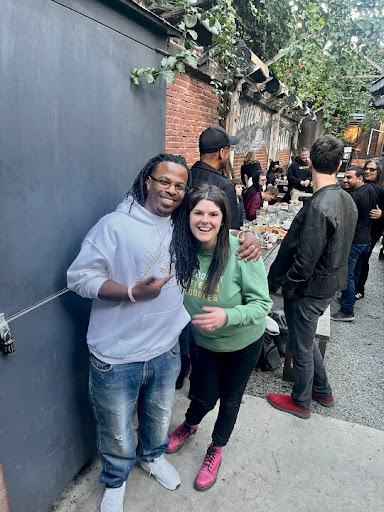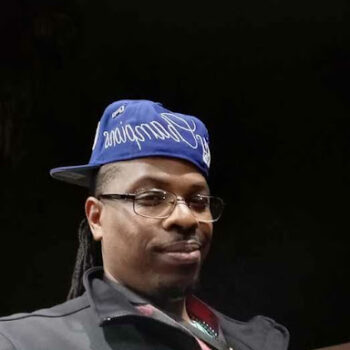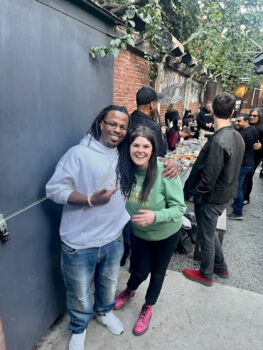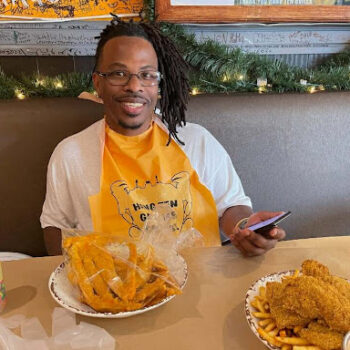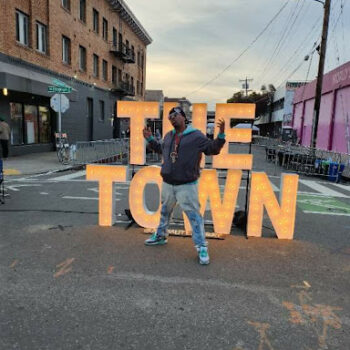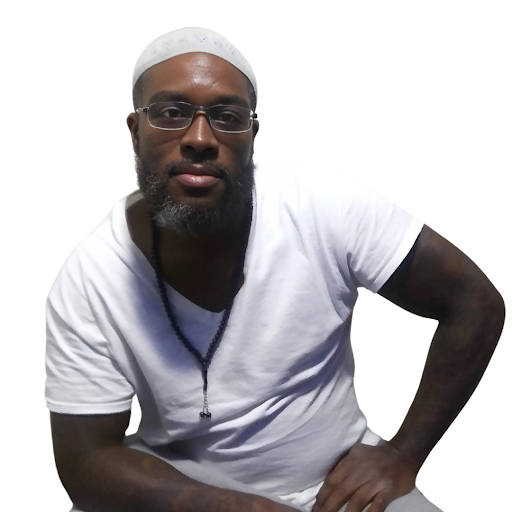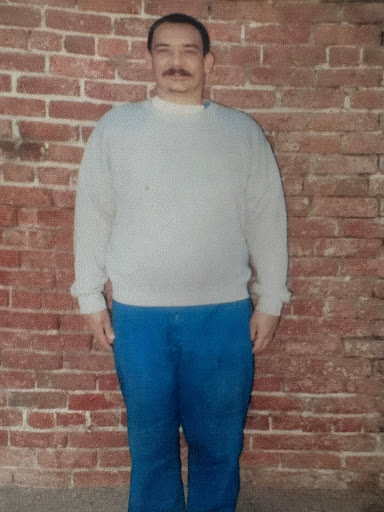Philippe “Kells” Kelly
Released after 23 years
Diane: Start us off by telling us how your parole hearing went.
Kells: I went to the parole board on September 7th. It was my third time. I had some doubts because I’d been denied twice before. The whole structure of how they do parole is not okay. There’s a lot of things that can’t be approved. How they actually evaluate people going to the board…in my mind, they’re already predetermined in what they want to do with folks. Guys don’t have a real opportunity to show up in a way that gets the board to think. They’re evaluating folks in a moment. They look at people’s fouls and make the determination then before they ask them to go in there. There’s preconceived notions and biases on particular crimes or how they feel about folks. I was feeling confident because I knew I’d done the work, but at the same time, in the back of my mind like – are they going to let me go? What’s going to happen? I went in there, and the commissioner was fair. He wasn’t in favor or against, he was just fair down the middle. He asked me questions and brought up scenarios for about an hour and twenty-five minutes non-stop. My lawyer gave a statement, and I gave a closing statement. Then my victim’s family had the opportunity to speak. The deputy commissioner had some questions. Then the victim’s family spoke again. Then another break. Then deliberation. My lawyer asked me how I felt about everything. We felt pretty confident at that point, but were still not sure. After 15-20 minutes we came back and they said all the bad stuff I did, how the crime I committed was horrible. Then he said, those things are mitigated, and they’re going to find me suitable. When I first heard it, I was like, “Hell no!” I was so shocked; I didn’t believe it when I heard it for the first time. I had to get up in my chair and pay attention, listening again. Then he said it again. It really didn’t settle in until he said it the third time.
Diane: How did you feel about the victims’ family being there?
Kells: I was pretty broken up. I was sad and hurt because their pain was still fresh, as if it happened yesterday. I wasn’t able to celebrate, because if I was celebrating having the opportunity to get my life back, it was like I was disregarding that someone just lost their life. It was difficult, it took me about a week to start to feel good about it. At that moment, I felt really bad. I realized not only what I did to him and his family, but how they’re still affected by the decisions I made. Twenty-three years later, it’s still fresh and it still hurts. I just didn’t feel right celebrating that I got my life back because he didn’t. He was a brother, uncle, father, friend, cousin… His family has got to deal with that. His daughter can’t continue to be raised by him.
Diane: After you were found suitable, you turned to your lawyer, what did you do?
Kells: She ran through my conditions of parole and that was it. The screen went blank and the hearing was over.
Diane: Did they give you a release date?
Kells: The board is made of 12 or 13 people and they have 120 days to affirm the decision. After that, it’s up to the government and they have 30 days. He has an election. Once he signs off, it’s typically five or ten days. Everybody’s situation is different, but that’s what typically happens.
Diane: How did you sleep after that?
Kells: I got some of the best sleep of my life! I didn’t have the stress of worrying about what’s going to happen. It wasn’t hard for me to sleep or anything. I finally don’t have to deal with this anymore. It was cool.
Diane: What was your next step?
Kells: Getting everything together in terms of what I’ll be doing, where I’ll be going… any job opportunities, housing, getting those things set up.
Diane: Your release date was coming up, how did you feel getting ready to walk out the gate?
Kells: I was relaxed. I wasn’t gonna lie, I was very relaxed. I was in a holding tank. It was a situation where I was like “Man, this is really about to happen, I’m really about to be free. I get the opportunity to get my life back.” I wasn’t too anxious, I wasn’t too up, I wasn’t too down.. I was ready to get out of there.
Diane: Did you sleep the night before?
Kells: I actually did. I slept decently. I woke up around four, which is typical.
Diane: Did you give some of your stuff away?
Kells: I left all that shit in there. I didn’t take too much of that crap with me.
Diane: How did you feel when you were let out of the car at the gate?
Kells: There were a lot of good people out there. A lot of good people that I’d been on this journey with for the past seven years. It felt pretty good. I was shocked, excited, anxious, nervous… I had a bunch of different emotions going on at one time. shock was the most prominent emotion.
Diane: What did you do next?
Kells: I went to my parole officer- that was the first thing I had to do. I didn’t want to get too caught up with people wanting to go to breakfast and all those things. I had to go right to my parole officer. Then I got something to eat and checked into the Dream Center.
Diane: Who were you in the car with?
Kells: David, a friend.
Diane: How did it feel moving in a car after twenty-something years?
Kells: It didn’t really matter because I’m a certified auto body repairman. I was working on cars in my last prison. I was doing auto body work and I’ve ridden in vans driving around the shop. I didn’t have any motion sickness or anything like that. It felt good because I was driving away from the prison, but I wasn’t overwhelmed by it.
Diane: Where’s your family?
Kells: They’re from Sacramento and Louisiana. I talked to most of them, but it’s going to take awhile before I actually get a chance to be out there.
Diane: You’re probably not in too big of a hurry, right?
Kells: I do want to go down there, but I have to prove to my parole officer that I’m responsible and make sure I get opportunities to explore and do stuff. I need to be able to handle business and whatever I need to do. I want to give it a little time.
Diane: What was your first meal?
Kells: Crab legs. First time I ever ate crab legs.
Diane: What did you think of them?
Kells: Uh, I ate all of them! It was pretty good.
Diane: Nice, is there other food that you’ve enjoyed since you’ve been out?
Kells: I ate sushi, I’ve eaten some vegan food, mostly seafood stuff. Shrimps. I haven’t eaten lobster yet- I’m looking forward to that one day. Yeah, mostly a lot of seafood stuff.
Diane: Do you get any fish inside San Quentin or in prison?
Kells: We get breaded fish like fish sticks. We had catfish for a little while. I had some red snapper for the first time a few days ago. That was really good.
Diane: How did you sleep in the Dream Center that night?
Kells: I didn’t sleep. I felt like it was a dream and that it was going to come and get me, that I was going to wake up in prison. So for those first few days I wasn’t getting much sleep.
Diane: Is there an experience you’d like to share this last month since you’ve been out?
Kells: My first day at work. That was a whole experience within itself. Being in a professional setting in a place where there is a lot of respect. Being introduced as a new contracted employee, seeing day-to-day operations. Seeing how things function. It showed me the proper, professional etiquette – in the way you carry yourself and conduct business. How you move within that space. The things you have to prioritize to make sure you’re on top of your work and not lacking. That if you do have questions, it’s okay to ask, and to make sure to keep asking questions.
Diane: What’s your job about?
Kells: Social and criminal justice work and reform. A lot of it deals with youth and policy work. Coming up with different bills: if we feel there’s a need to change something in particular, we’ll brainstorm about it, put together the language, make it into a bill, shop around for different authors who will author the bill for us like senators, assembly people, and then go through the necessary steps to get that to the house floor or the senate floor. Then, we have the governor approve and sign it, and then make it a law.
Diane: So who are you working for?
Kells: Ella Baker Center.
Diane: How many hours a week do you work?
Kells: Twenty hours a week.
Diane: That’s perfect. And are you still going to Sirius XM?
Kells: Yeah, I’ll start that next week.
Diane: Do you share a room with someone at the Dream Center?
Kells: Yeah.
Diane: Who’s your roommate?
Kells: I don’t really know his name to be honest. I’m never really there.
Diane: What have you done for pleasure since your release?
Kells: I went to a virtual-reality video game place. I got interested in being in the virtual reality world. It was great.
Diane: What does the future look like?
Kells: I think the future looks pretty bright. I have a huge support system of people who are pushing me to be successful. I’ve seen a lot of success in a multitude of ways. It’s not necessarily about having money but about having an impact on the world. It can change. A lot of stuff is broken in the world, so I’m trying to utilize my talents, voice and opportunity at the Ella Baker Center to affect change.
Diane: How long do you have to stay at the Dream Center?
Kells: Six months.
Diane: What do your days look like?
Kells: Work stuff, hanging out with folks. That’s how it is until my work load increases. For right now, I’m just doing some onboarding, work things, meetings. Hanging out, working on my laptop, honing my skills.
Diane: Anything else you want to share?
Kells: I’m just excited about life and having the opportunity to be out here again. Everything is so magnified as far as all the little things people typically take advantage of. I’m able to walk out of my transition office and go to the store. I don’t have to ask for permission or wait for someone to get me something to eat. I can just walk to the store without restriction. The little things mean much more than they did the first time I was out. I appreciate life in that way.
Diane: Tell me about that song you want to do for Humans of San Quentin.
Kells: I wanted to do a Hip Hop song. It would talk about what my experience was and what I think about serving people and giving them an opportunity to get exposure and possibly help them get out. You never know who looks at these sites and somebody might be intrigued by a person’s story and might want to help them.
Diane: I’m coming to pick you up and take you to eat lobster.
Kells: Yeah, I can’t wait!

